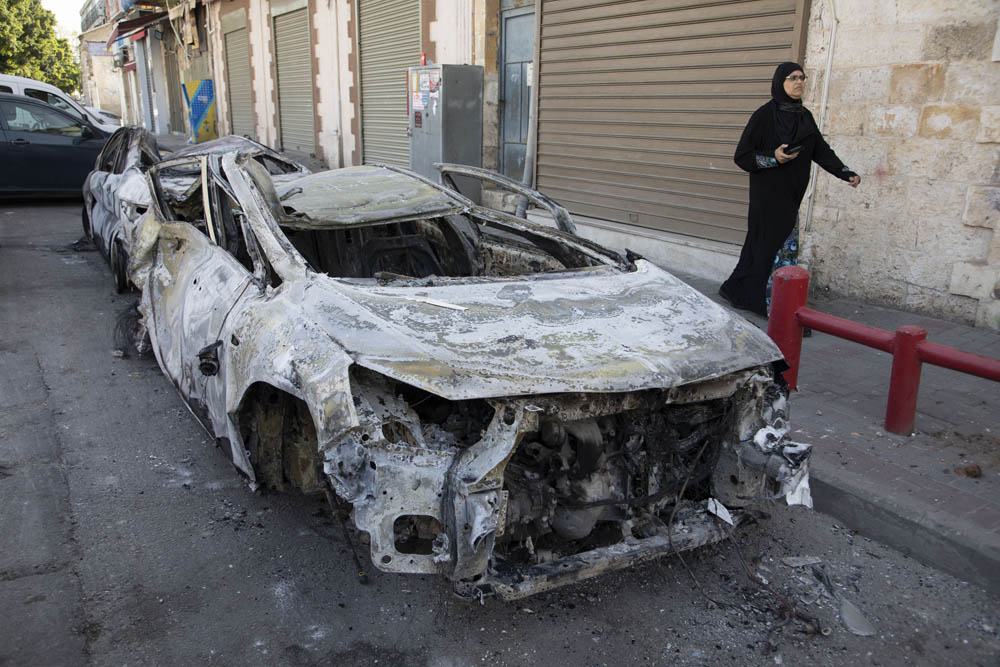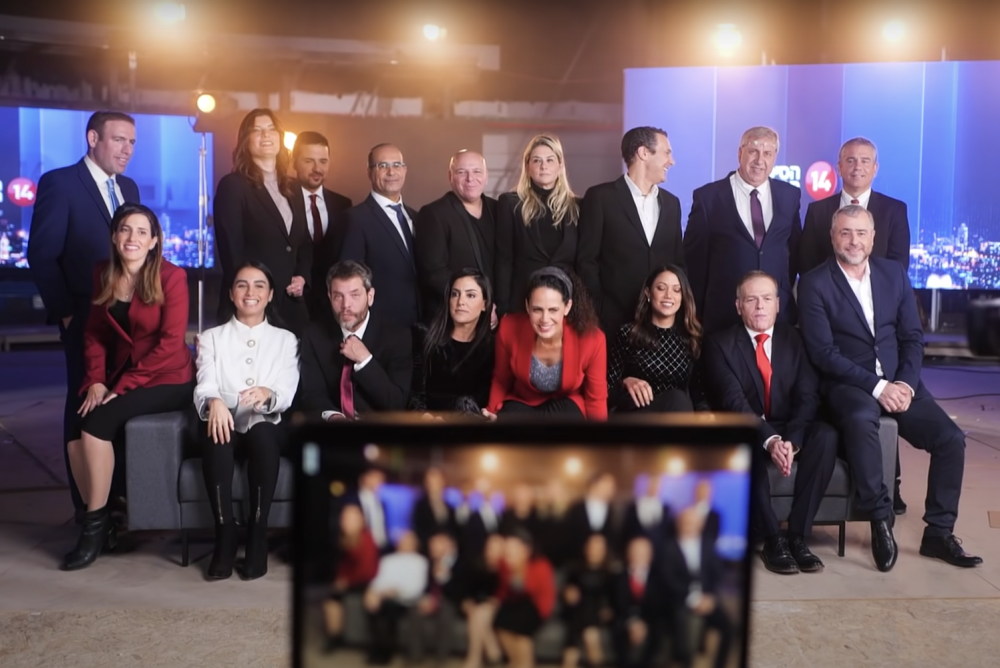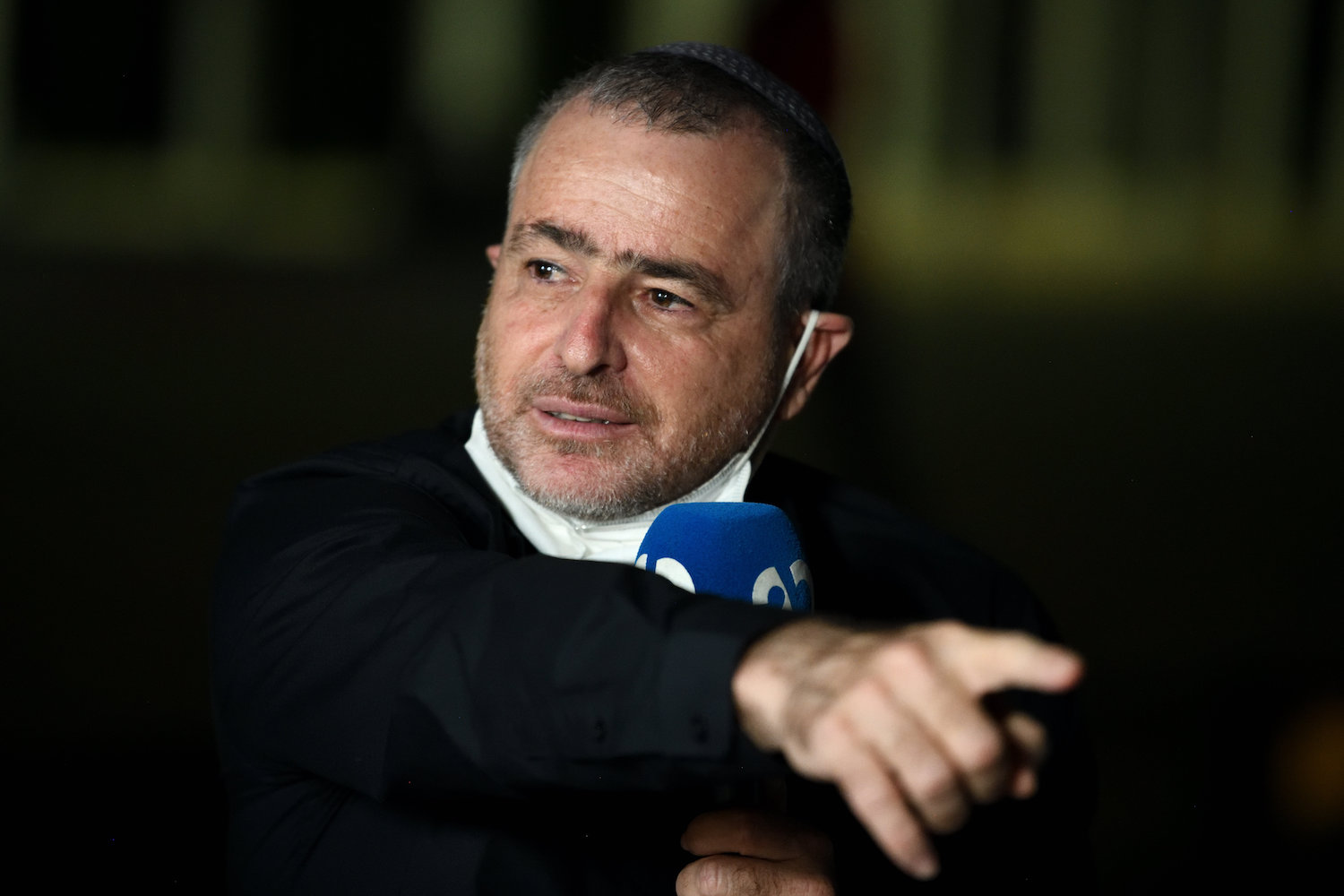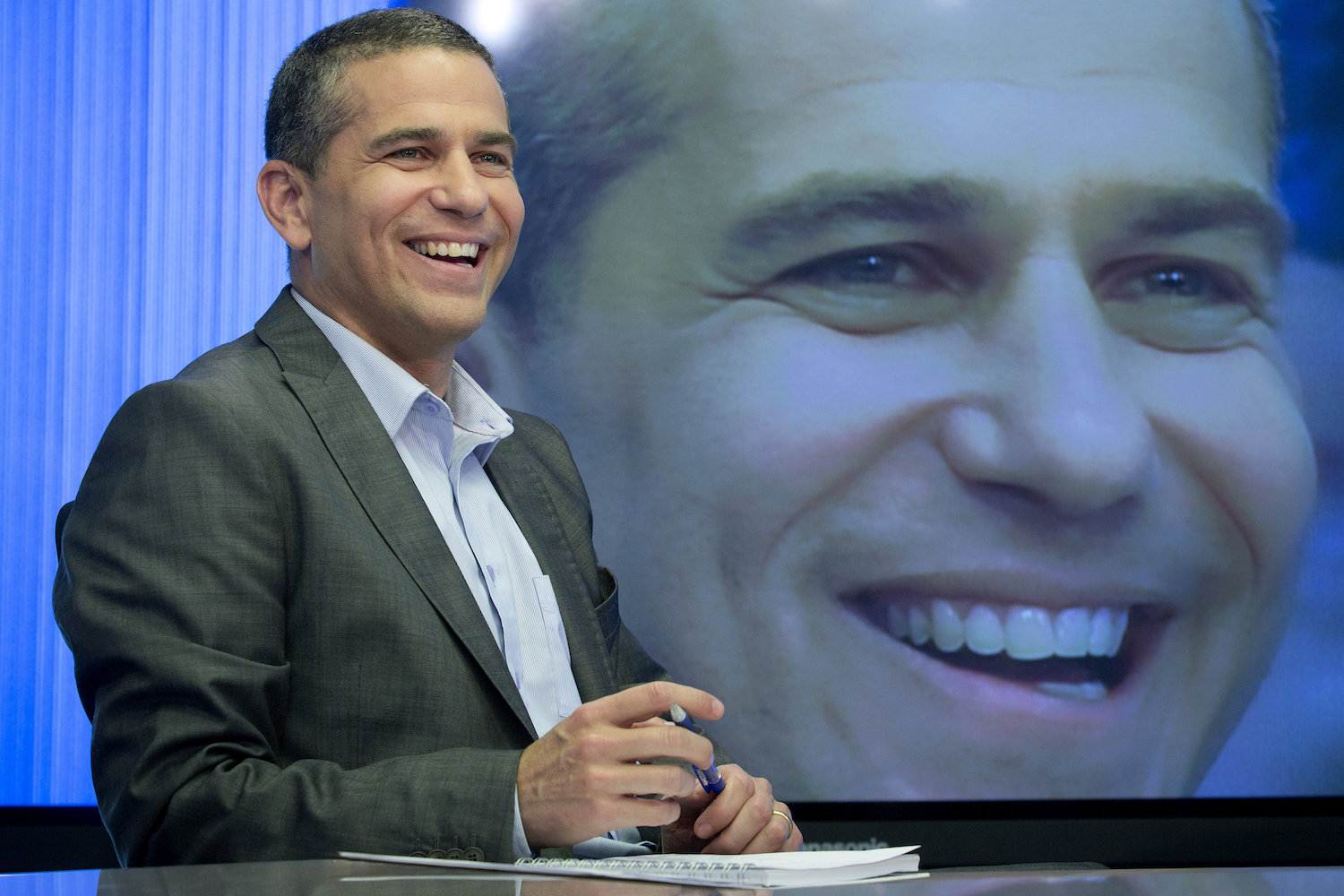It was a long, slow week for Now 14. Israelis were preoccupied with the Omicron variant, and the news cycle was dominated by images of long lines at PCR drive-in centers and debates over the Israeli government’s decision to keep schools open at all costs. This was not the sort of news the channel was waiting for. Now 14, Israel’s first all-news station, was designed to promote the right’s agenda, spread conservative ideology, and fight progressives. With the pandemic dominating the news, the channel’s hotshots failed to muster much enthusiasm.
Shimon Riklin, a former right-wing activist with a strong Twitter following and one of Now 14’s stars, devoted the main item on his daily show to a pilot program for gender-inclusive education at pre-schools. His guest, Roni Sassover, a right-wing candidate who failed to make it into the Knesset and now heads “The Parents’ Forum for Tradition,” called on parents to boycott kindergartens. Meanwhile, the panelists on Now 14’s primetime show, “The Patriots,” debated a viral video of a left-wing professor making anti-democratic remarks about the merits of elite rule during a private conversation. Erel Segal, another popular journalist on the right, attacked former Prime Minister Ehud Olmert in his opening monologue, then hosted journalist and novelist Irit Linur — herself a former hotshot of the channel — who spoke against surrogacy for same-sex couples. That the broadcasts were repeatedly plagued by technical glitches only added to the tired, low-tech atmosphere.
Then, on Wednesday, something finally happened. As the Knesset approved legislation allowing Palestinian homes inside Israel that were built without a permit to be connected to the national power grid, a shouting match broke out as Prime Minister Naftali Bennett got up and confronted the opposition in the plenum. His rival, former Prime Minister Benjamin Netanyahu, turned his back to him and left the hall. At last, the people at Now 14 had something to rally around. Their eyes lit up; suddenly, there was passion in the air.
Between calling him “the neighborhood bully,” “a child with daddy issues,” “a little spineless man,” and remarking that it is “sad to see someone like Netanyahu having to listen to this man,” there wasn’t a single insult that wasn’t lobbed at Bennett. The collective tantrum continued through Thursday’s morning shows. “I felt sorry for him,” said one host. “I worry for his health,” answered the second. “We are held hostage by a man who wanted his resume to include the title of prime minister,” said the first panelist.
During all the shows I watched, not a single speaker, guest, or anchor defended Bennett. Nor was there a single Palestinian speaker to talk about the lack of electricity in their community, nor anyone brought on to defend the rights of same-sex couples earlier in the week. Now 14 does not even pretend to be “fair and balanced;” it seeks to become the home channel of the new, pro-Netanyahu right in Israel. And as such, it reflects this camp’s mood: unashamed, occasionally racist, hateful of anything that smells remotely left wing or progressive, and teetering between arrogance and paranoia. “This is the first step in Israel becoming a state for all its citizens,” warned one panelist after Palestinian MKs delivered speeches in Arabic before the Knesset plenum during a debate over the electricity law. “I hope you are not going to be delivering the news in Arabic,” said the show’s host, as he introduced the news anchor.
The new front lines
TV channels in Israel operate according to a permit system and are supervised by a government agency (The Second Radio and Television Authority in Now 14’s case). Now 14, was launched in 2014 under its previous incarnation as Channel 20, under a license to broadcast content relating to Jewish heritage. Already during its first years, the channel was fined for airing a right-wing election rally, broadcasting news, and hosting a political interview with Netanyahu. It was also fined for violating its mandate by not airing any content relating to Reform or Conservative Judaism.
In 2018, Netanyahu’s Likud party promoted legislation paving the way for Channel 20 to become a full-time news channel — a one of a kind in Israel. Netanyahu always had an obsession with the media, particularly television. In his biography “The Netanyahu Years,” Israeli journalist Ben Caspit recounts how the former prime minister, upon returning from a trip to the United States, spoke about a new channel called Fox News, which he said was going to transform America. “In his heart, Netanyahu was dreaming of leading a similar move here, in the Holy Land,” writes Caspit. Netanyahu spokesperson turned state-witness, Nir Hefetz, recently testified before a court as part of Netanyahu’s ongoing corruption case regarding his involvement in Channel 20’s affairs. “100 percent of my activity on Channel 20 was directed by Netanyahu,” Hefetz told the judge.
Under the new legislation, Channel 20’s owner, billionaire Yitzchak Mirilashvili, was exempt from the regulatory duties to which private channels are subjected, such as airing a minimum amount of original content or dedicating several hours a week to broadcasting in Arabic. Most importantly, the new channel was allowed to broadcast news-related content on a 24-hour basis.
With the legal hurdles gone, the Israeli Fox News could finally be launched.
Last November, Channel 20 renamed itself Now 14 and was relaunched with an all-news programming schedule, made up almost entirely of low-budget studio shows — talk radio, only on television. Most of the talking heads hired by the channel were younger right-wing personalities, particularly columnists and activists who are well known on Twitter. This includes the likes of Riklin, Segal, and Linur, as well as former Jewish Home MK Yinon Magal and satirist Yotam Zimri, all of whom rose to prominence during the Netanyahu years and rallied around the former prime minister as his legal troubles mounted.
With very little field reporting and a constant rotation of a limited number of guests, watching Now 14 feels like diving into a 24-hour loop of the right’s stream of consciousness. If the mainstream media still speaks about West Bank “outposts,” referring to settlements built without official approval, on Now 14 they are referred to as “the young settlements.” Stone throwing in the West Bank is deemed “stone terrorism.” The “progressive movement” is constantly decried as the source of all evil. The influence of the American right is evident, especially in the channel’s obsession with mocking political correctness and so-called cancel culture.
Now 14 holds a special place for journalists and intellectuals, such as morning host Shai Golden or panelists such as Dr. Gadi Taub and Irit Linur. Linur, who moved from the political left to the right. Linur famously canceled her subscription to Haaretz during the Second Intifada, accusing the newspaper of “anti-Zionism” (which was not enough to stop her from later publishing in Haaretz). “All the smart people are now on the right” is a sentence commonly heard on Now 14, betraying a certain inferiority complex.
Sometimes things go over the top. In May of last year, a journalist for Channel 20 reported on a rocket fired from Lebanon that exploded in a soccer stadium in an Arab town in the north, lamenting that “unfortunately, it didn’t cause many fatalities.” The channel apologized and the reporter was fired. Channel 20 was forced to issue yet another apology for a post celebrating the recent death of a Palestinian member of Knesset. In December, following Now 14’s launch, a panelist and a former spokesperson for Naftali Bennett told his fellow panelists on the channel that “The Arabs have forgotten the Nakba, it’s time to remind them of it.” This time around, the station didn’t apologize, but rather celebrated the item on its social media platforms.
I compared the evening news broadcast on Now 14 to that of Channel 12, Israel’s highly influential and most-watched news program. While the opening lineup was not that different (Omicron, an Israeli attack on Gaza), Now 14 moved on to issues important to the Israeli right. First was an item on a Bedouin mayor in the Naqab/Negev who was taped speaking about the ways Israel takes over Palestinian land; the reporters and editors at Now 14 found it enraging that an elected official is allowed to speak against the state in this fashion. The next story dealt with a case of arson committed by a Palestinian citizen in Lydd.

Ever since the violent clashes broke out between Jews and Arabs during the last Gaza war, the right has been paying much attention to the so-called “mixed cities,” and especially to Lydd. The narrative on the right is that life in these cities has become unbearable for Jewish Israelis, and thus Israel’s security forces should deploy the Shin Bet and the army rather than the police, and use more force against the Palestinian citizens living there. Accordingly, the item on Now 14 painted the arson as part of a national struggle, despite the fact that the police were still investigating the issue, and have yet to conclude whether it was ideologically motivated.
The battle over Palestinian land in the Naqab/Negev, over Area C in the West Bank, and over the mixed cities — these are the front lines for the Israeli right today. Ever since last May, the mixed cities have moved to the top of the list, so much so that Now 14’s morning show is co-anchored by a young Jewish woman from Lydd who became famous following her posts and videos on social media about what she termed “life under terror” in her city.
What’s next for Netanyahu’s right?
The last decade has seen an explosion in the growth of right-wing media in Israel. This trend began in earnest with the pro-Netanyahu newspaper Israel Hayom, which was launched by deceased casino billionaire Sheldon Adelson in 2007 and is today the most widely-read paper in Israel (though its ability to set the national agenda is limited). There is the pro-settler Galey Israel radio station and the Makor Rishon newspaper, as well as several small but active internet sites, including Mida, Room 0404, Arutz 7, Srugim, and HaKol Hayehudi, each representing a slightly different right-wing constituency and ideology. And, of course, there is the dominance that right-wing influencers enjoy on Hebrew-language Twitter.
Now 14 is one of the more ambitious projects in this ecosystem, as it aims to consolidate a large viewership made up of Israeli conservatives and political junkies. The channel refuses to allow its audience to be measured through official metrics, but according to assessments, its viewership ranges between one and two percent of the Israeli population, or around 30,000-60,000 people. While these numbers are relatively low, they are likely to increase once the channel finds its footing.
The most interesting feature of Now 14, however, is its complete devotion to former Prime Minister Netanyahu, as demonstrated by the attacks on Bennett, who is not exactly a leftist, even by Israeli terms. Netanyahu was the guest of honor on the night of Now 14’s launching; “King Benjamin will arrive here at 20:00,” announced Yinon Magal, one of the two journalists who later conducted an interview with the former prime minister, at the top of the evening.
How to deal with Netanyahu is a major issue on the right today. The former prime minister, who now appears on the verge of signing a plea deal over his corruption trial that may remove him from public life for the next seven years — and likely for good — now heads the opposition as well as his own Likud party. And yet, while still immensely popular, Netanyahu does not command a majority in the general public and many on the right — particularly among the settlers and national religious — are ready to move on, especially since they suspect Netanyahu puts his own personal welfare before that of the right wing.

On the other side are right-wing Knesset members, activists, and journalists who view Netanyahu’s corruption trial as a coup d’état by the left and the judiciary, and accuse any person who dares question his leadership as a traitor. His most diehard supporters, many of them from the Jewish working and lower middle classes inside 1948 borders, still constitute a majority on the right. Thus, very few will openly challenge his leadership, yet the bad blood between the two right-wing camps is evident.
Two weeks ago, I watched Erel Segal, perhaps the most talented of Now 14’s anchors, grill two well-known settler figures, Haggai Segal (the two are not related; Haggai was convicted of carrying out a terror attack against Palestinian mayors in the 1980s as part of the Jewish Underground, and now edits Makor Rishon) and Daniella Weiss, the former mayor of the settler stronghold Kedumim and one of the most prominent faces of the settlement movement. During both interviews, Erel Segal tried to get the guests to condemn Bennett and his government, losing his temper when they failed to do so (or weren’t aggressive enough when they finally did). He accused the settlers of betraying the very groups that supported them and ultimately brought them to power. “We are no longer partners,” Segal the anchor told Segal the settler.
This war on the right is the most interesting political development since the last elections and the forming of the Bennett government. With a potential plea deal for Netanyahu on the horizon, the question is now whether the right can re-group with Bibi gone, or will his departure only deepen the rift, and present the embattled left with new political opportunities.




